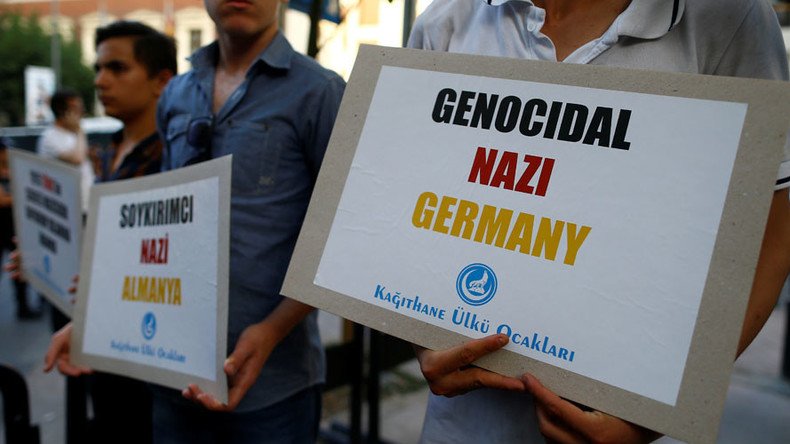‘They burned Jews, now slander us’: Protests in Turkey over German motion on genocide (VIDEO)

The Bundestag’s recognition of the genocide of Armenians has sparked a fierce backlash from Turkish officials, while angry Turks rallied in Berlin and Istanbul. Their harsh words contrasted with the prime minister’s assurance the relations won’t suffer.
“They burned Jews in furnaces and now they slander the Turkish people by accusing us of some genocide. Why don’t you look at your own history first,” Justice Minister Bekir Bozdağ said, as cited by the Anadolu news agency following the vote.
The German parliament on Thursday passed a non-binding resolution that called the mass killings of Armenians on Turkish territory during World War I ‘genocide’. The decision was passed by an overwhelming majority amid a protest rally of ethnic Turks, who gathered in front of the parliament.
Turks yelling Allah Akbar during protest outside German Consulate in Istanbul to deny #ArmenianGenocidepic.twitter.com/iSnfLcVzUo
— Zeynep Karatas (@karataszeyno) June 2, 2016
Bozdağ was among the Turkish officials who fiercely decried the German move, saying it was insulting, but irrelevant.
“Even if all parliaments of the world pass a similar decision, they would not besmear or nation, our state and our history. We have nothing to be ashamed of,” he said, adding that there would be consequences for Germany. “The Turkish people and the Turkish state never forget their friend or their enemies.”
Turks protest one-sided Armenian motion https://t.co/lTawAzkMcHpic.twitter.com/EmM82AO0nF
— Turkiye Newspaper (@tgnewspaper) June 2, 2016
After the resolution was passed in the Bundestag, Ankara recalled its ambassador to Berlin. Armed riot police were deployed outside the German consulate in Istanbul, near Taksim Square, where protesters gathered to condemn the vote.
In a rare moment of solidarity, three Turkish political parties, including the ruling Justice and Development Party, issued a joint statement to denounce the development.
"This decision which is against history and the future will no doubt have an impact on German-Turkish relations and will damage bridges of friendship between the two countries," they wrote.
The German government insists that its partnership with Turkey should not be affected by the genocide vote, and some Turkish officials voiced similar statements in an apparent bid to defuse the tension.
“Turkey and Germany are very important allied countries. Nobody should expect that our relations with Germany to get worse completely and suddenly due to such resolutions,” Turkish Prime Minister Binali Yildirim said on Friday.
German Turks protest the motion to recognise Armenian genocide in Berlin: https://t.co/MbdpBFT0qtpic.twitter.com/QZYCV8ERSv
— Ankaralı Jan (@06JAnk) June 1, 2016
During 1915, between 800,000 and 1.5 million ethnic Armenians were killed by Ottoman forces. Turkey disputes the scale of the tragedy, also denying that the deaths were an intentional result of a government policy.
The events are recognized as genocide by 29 UN members, including Russia, Brazil, France, Italy and Canada, as well as EU bodies like the European Commission and the European Parliament.
In the US, almost all states acknowledge the genocide, but the federal government does not. The situation is similar in the UK, where regional legislatures of Northern Ireland, Scotland and Wales passed resolutions to call the killings genocidal, but the government in London does not recognize it as such.












